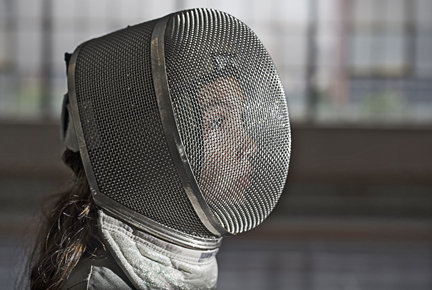The Cobra Fencing Club occupies a bright open space in the Lackawanna Warehouse. Light streams through enormous windows that overlook Jersey City and Hoboken. The place is full of people ranging in age from children to middle-aged adults. They are participating in sword fights, known within the sport as bouts, their faces obscured by mesh masks.
Cobra holds classes for kids as young as 6. Students begin with plastic weapons under the close guidance of instructors. The sport is ideal for children because it enhances agility and concentration.
“It’s a civilized, ferocious make-believe sword fight,” Cobra founder Steve Kaplan says. “It came from killing and blood and death but it evolved into a sport that is, for the most part, a very safe sport. There’s no collision. You fight like crazy and at the end of it you salute and shake hands.”
Kaplan was a bit older than his beginner students when he first picked up a sabre.
“I grew up in Queens and I was 13 and I was a baseball player,” Kaplan says, so he tried out for the high-school baseball team.
“There were probably 300 boys at tryouts and I didn’t quite make it,” he says. “I thought my life was over. I tagged along with a friend and decided to try out for fencing. You didn’t need any background. Eleven years later both of us were on the Olympic team.” That was the 1976 Montreal Olympics, and his high-school buddy was Martin Lang who competed in Montreal for the foil team, referring to another type of fencing weapon. Though Lang currently lives in Florida, the two men are still in touch.
“It was a dream come true,” Kaplan says. “I placed 28th, which didn’t put me on the cover of Sports Illustrated.”
He did score the sole point the U.S. team earned against the Soviets in their 1:9 match, earning Kaplan a mention in the New York Times. The Russian victory came at a time when the Soviet Union dominated many sports. “I trained with a great Hungarian coach named Csaba Elthes,” Kaplan says. “The Hungarians are to sabre fencing what the French are to Impressionism. Csaba came from this tradition from Hungary and brought it to New York. In my last years as a student I told him that I wanted to coach. I very much have adopted his method and style of teaching with some adaptations because all sports must evolve.”
Girl Makes Good
Kaplan retired in 1979 when President Carter announced his boycott of the 1980 Moscow Olympics. Kaplan took time to raise his family in Jersey City before beginning his coaching career. “In 1980, my wife and I wanted to own our own home,” he says. “Jersey City was affordable, and we saw potential in the downtown area.”
The approach may be traditional, but Cobra is modern. Protective gear is made of metallic material that senses the touch of the opponent’s blade. During each bout the gear is plugged into tethers that connect to the scoreboard so each point is accurately recorded. Tournaments at Cobra are streamed online so parents and fans can see the action.
One student to watch is Lola Possick, who at age 10 has been competing for two years. “She used to spend a lot of time in the club watching her brother Owen,” Possick’s mother Cathy Villa says. “One day she said, ‘I think I want to try it.’”
After spending a year learning, Lola competed in her first tournament at Cobra and won. Now she competes locally, regionally, and nationally, attending one or two tournaments a month. She recently placed first in the 2015 USA Fencing National Championships in the women’s “sabre” division. “It felt like I had achieved my dream and I felt very, very happy,” Lola says. “I had tears of joy in my eyes.” She hopes to one day compete in the Olympics.
Villa says that fencing is a great activity for her children. “It keeps them active, it keeps them exercising, and really focused. It just makes them think,” she says. “They say it’s like a physical chess.”
Sabre Rattling
“Lola is our first national champion. She is really, clearly the best in the country at her age level. Now if she holds that position into her teens, we’ll see,” Kaplan says, hinting at Olympic potential.
Fencing is a lifelong sport, with fencers competing into their 80s.
“No one gets automatically discounted,” Kaplan says. “As long as you’re able to get out on the strip, you can fence. Let’s say your daughter wants to be a gymnast and when she’s 8 or 9 she has a growth spurt and it becomes clear she’s going to be a big strong girl. Her chances of taking it far are over. Let’s say you have a child who wants to be a basketball player but they’re not really tall. In fencing we have world champions who are 5 foot 7, we have world champions who are 6 foot 7.”
“Why not try it yourself?” Kaplan says, gesturing toward a fit man fiercely thrusting a sabre at a helmeted mannequin. “He walked in recently and said he had always wanted to give fencing a try. He comes here instead of a sports club now.”—JCM
